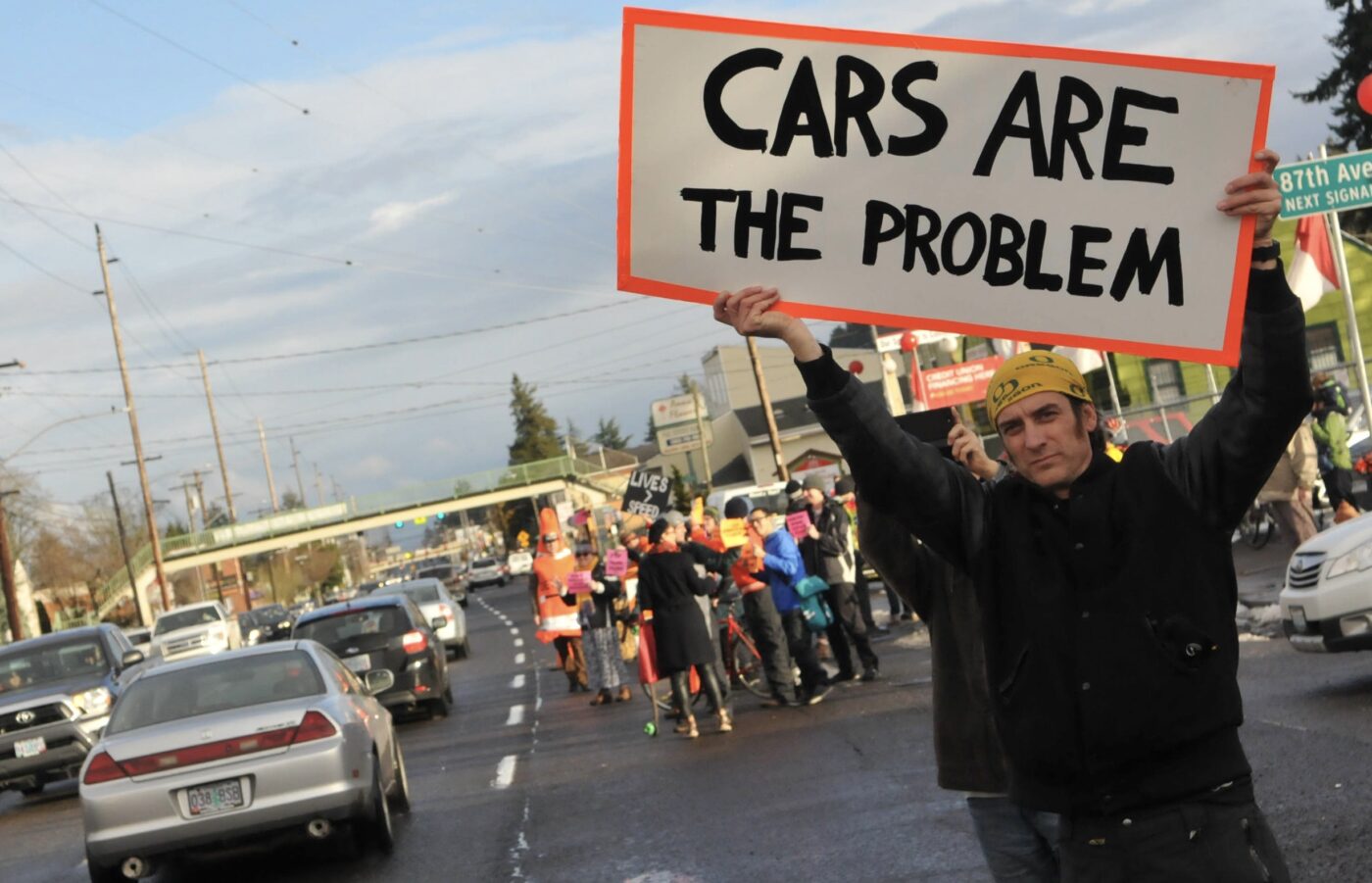 From a road safety protest on SE Division in December 2016. (Jonathan Maus/BikePortland)
From a road safety protest on SE Division in December 2016. (Jonathan Maus/BikePortland)
I’m still going through the recent bicycle count report published by the Portland Bureau of Transportation this week and there’s something I need to make very clear: The reason more people aren’t biking is not because of some flaw in the idea of bicycling itself or even because of any shortcomings in the network of roads, paths, and lanes that people do it on.
The problem is cars. Too many cars, to be exact. And too many of them driven without regard for others. This isn’t just my opinion, it also happens to be the official stance of the City of Portland.
This problem has always been right in front of our faces but we don’t recognize it as such because it requires us to acknowledge that something we (nearly) all do on a regular basis might actually have negative impacts on our community and our city. Put another way, the problem is us, and that’s the problem. Not only is driving a car something the vast majority of us do and sympathize with, it’s also normalized by trillions of dollars in marketing over the last century as something that is cool, fun, and harmless. When you’re in a car, Big Auto propaganda says, everyone else is the problem. None of that is true of course, but this is America! With enough money and marketing savvy, you can convince people of anything.
But I digress. What I want you take from this post is a clearer understanding of what has happened on Portland streets in the past decade.
As many of you know, I’ve thought a lot about why bicycling leveled off and then declined in Portland (even before the pandemic). I’ve also tracked closely what PBOT says (and doesn’t say) about the matter. On that note, did you happen to read what PBOT said in the “Discussion” section of the report? On page 16 you’ll see three reasons cited as the causes for the decline in cycling in Portland over the past ten years. Here they are (emphases by PBOT):
The population soared, with an average of about 10,000 new resident commuters hitting the roads each year from 2014 to 2018. Unlike in previous years where biking and working from home absorbed the plurality of new commute trips, during this period it was driving alone. This likely translated to less comfortable conditions for biking. Public perceptions of safety have dropped. People are driving faster and yielding less since the pandemic, and 2023 was a record year for traffic deaths. But it goes beyond transportation. Anecdotally, the rise in houselessness, encampments along bikeways, as well as open drug use, have deterred some riders. It has continued to be exceptionally easy to drive a personal vehicle, with a preponderance of street space dedicated to vehicle movement and storage—often at the expense of people who walk, bike, roll, or take transit.Notice what all three have in common? Cars. Too many cars, to be exact. And too many of them driven without regard for others.
 From 2022 Portland Insights Survey, City of Portland Budget Office
From 2022 Portland Insights Survey, City of Portland Budget Office
I understand PBOT is inherently biased against reaching some conclusions about the decline (such as their anemic designs, lack of political power to sway City Hall dysfunction, and so on) and that just like I often say bicycles and their riders are easy scapegoats, I recognize it’s very easy to blame cars for everything.
But in this case, as the City of Portland itself appears comfortable doing, blaming too many cars is a reasonable conclusion — especially when you consider what happens when cars are removed from the equation, like during Sunday Parkways events or during the pandemic when bicycling and walking on our streets skyrocketed. It’s also worth noting that the PBOT staffer who wrote this leaned on the 2022 Portland Insights survey that found nearly half of all 5,290 people who responded said they’d be interested in biking more if it were affordable and safe (see above).
So next time a city staffer or elected official is in a meeting and says they just can’t imagine why bicycling has struggled in Portland, remember they’ll probably leave that meeting, drive home in a sea of hundreds of other cars, and wonder what all the fuss is about.

